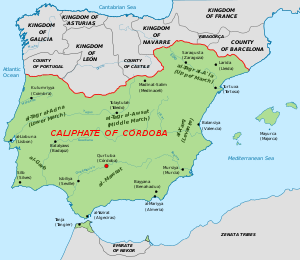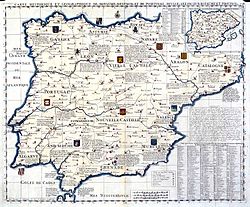
Back معركة الخندق (939 م) Arabic سیمانکاس دؤیوشو AZB Битка при Симанкас Bulgarian Batalla de Simancas Catalan Schlacht von Simancas German Batalo de Simanko Esperanto Batalla de Simancas Spanish Simancasko gudua Basque نبرد سیمانکاس Persian Bataille de Simancas French
| Battle of Simancas | |||||||
|---|---|---|---|---|---|---|---|
| Part of the Reconquista | |||||||
 Map of the Caliphate of Cordoba circa 1000. | |||||||
| |||||||
| Belligerents | |||||||
| Kingdom of León | Caliphate of Córdoba | ||||||
| Commanders and leaders | |||||||
|
James the Great (According to the Legend) Ramiro II of León Fernán González of Castile García Sánchez I of Pamplona | Abd-ar-Rahman III | ||||||
| History of Spain |
|---|
 |
| Timeline |
The Battle of Simancas (also called Alhandega or al-Khandaq) was a military battle that started on 19 July 939 in the Iberian Peninsula between the troops of the King of León Ramiro II and Cordovan caliph Abd al-Rahman III near the walls of the city of Simancas.
The battle unfolded after the army of Abd al-Rahman III launched toward the northern Christian territories in 934. Abd al-Rahman III had gathered a large army of caliphal fighters, with the help of the Andalusian governor of Zaragoza, Muhammad ibn Yahya al-Tujibi. The Leonese king Ramiro II led the counterattack with an army constituted of his own troops, those of Castile under Count Fernán González, and the Navarrese under García Sánchez I.
Arab witnesses chronicle a spectacular eclipse of the sun that took place on the first day of the battle:
As the army arrived near Simancas, there was an awful eclipse of the sun that covered the earth of a dark yellow amid the day and it filled us and the infidels with terror as neither had seen in their life such a thing as this. Two days passed without either side making any movement.[1]
The battle lasted some days, with the allied Christian troops emerging victorious and routing the Cordovan forces. Furtun ibn Muhammad al-Tawil, wali of Huesca, withheld his troops from the battle. He was hunted down near Calatayud by Salama ibn Ahmad ibn Salama, taken to Córdoba, and crucified in front of its Al-Qasr.[2]
- ^ Martínez Díez 2005, p. 356, vol. I.
- ^ de la Granja, p. 528